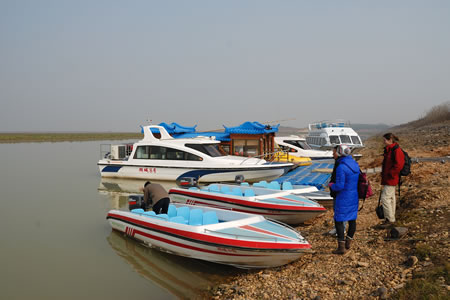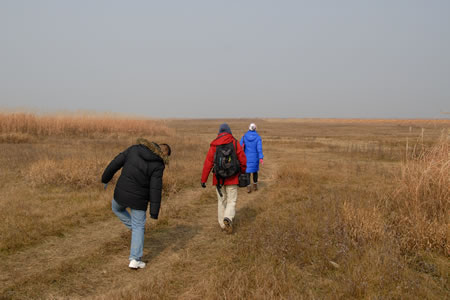

| Crane Kingdom | |
Chángshā (China), January 9th 2010 |
|
We travelled all the way to the city of Nánchāng with only one goal in mind: to see the cranes. Nánchāng is the ugly capital of the Chinese province Jiāngxī, but it really doesn’t matter to us. By the way, most provincial cities that we saw so far in China are ugly. They are dominated by many Soviet style grey and concrete bocks of flats that are built to house the many labour workers that came tot these cities last decades in search of work. Especially in this time of the year, when the weather is sometimes nasty and hazy, you can get the feeling that you appeared on the set of a depressive tragedy. But it really doesn’t bother us because our goal is still clear: to see the cranes on Poyang Lake, the biggest fresh water lake of China. Poyang Lake is located in the middle reaches of the Yangtze River and is one of most important wetlands in the world. It is the largest bird migration area in Asia for cranes, geese, ducks and swans. Due tot the abundant presence of fish, shrimps and snails, Poyang Lake National Nature Reserve is an ideal place for birds to spend the winter. One of these birds is the rare and critically endangered Siberian Crane; a bird we really like to see. We realize ourselves that this is our once in a lifetime chance to see this special bird, because not many are left and the places where they can be seen are limited. We did some research on the Internet and found out that the small town of Wucheng Zhen (吴城镇) is the place to be. This is the best place on the shores of the lake to see the birds; at least if the view is not blocked by frequent appearing fog. We also read that the town is reachable by boat or bus, both from the city of Nánchāng. |
|
 |
|
Preparing the boat for our journey on the wetland |
|
Our plan is to travel to Wucheng Zhen and to spend some days around town to do some bird watching. Armed with a map we try to find the harbour which is the departing point for the boats to Wucheng Zhen. Eventually we find the harbour, but people on the spot tell us that there are no boats to Wucheng Zhen; at least that is what we understand because communicating with Chinese people who do not understand English is a hell of a job. The second option we have is to take the bus. We go to the bus station and prepared ourselves with a short note in Chinese on where is mentioned that we want to buy two bus tickets to the town of Wucheng Zhen for the following morning. However, the lady behind the desk never heard of the destination. We decide to go to lady behind the information desk, and after we pointed her out our wanted destination on the Chinese-language map, she tells us that no buses go there. That was our second option and by losing that one, the only thing that we can conclude is that we can’t reach Wucheng Zhen by public transport. These are the moments that we really hate the fact that we don’t speak Chinese. After some reconsideration we find one more option: a private car with driver who can take us on a day trip to Wucheng Zhen. It will cost us some extra money, but we realize that we are now here and this is our only chance to see the Siberian Cranes. We go back to our hotel because that’s the only place we know with some very basic English speaking Chinese. We tell the ladies behind the reception about our plan, and after a couple of minutes explaining, by showing them the map and the bird book with the drawings of the cranes in it, they understand. One of the girls runs outside and after a couple of minutes she comes back with some kind of a taxi driver. Together with the girls of the reception we explain our plans, and after some thinking and calling, he tells us that he can bring us to the birds for Y500 (= € 50). We don’t know if he can deliver his promises, but the chance costs us € 50. |
|
 |
|
mr. Fix doesn't like mud on his white sneakers |
|
| The next day at six o’clock in the morning, we step in a very small ‘made in China’ minibus. The man we spoke yesterday is not the driver for today, but the co-driver. We call him ‘Mr Fix’ because it seems to be his job to fix everything, and to earn money with it. Soon after we started the ride, we conclude that we are not going to Wucheng Zhen, because we are driving in the wrong direction. We decide to keep our mouths shut because it has no use to discuss with somebody who doesn’t speak English. He knows what we want, so we give him a chance. The reason why we don’t go to Wucheng Zhen is unknown to us. After a long drive of two and a half hours, we arrive in the town Bōyáng. The driver stops the car in the centre of the city, and Mr. Fix is calling with his mobile phone, something that he did a big part of the ride. He is probably ‘arranging’ something. He signs us to wait, and after waiting for almost an hour, another car and driver stops and we are asked to change cars. We do not know what the reason is, but we assume that our initial driver does not know where to go exactly, so Mr. Fix arranged a different car and driver for the remaining part. But also the local driver is not really familiar with the area. He has to ask directions several times, and eventually at around eleven in the morning we arrive at the shore of the Poyang wetland.
When we get out of the car we immediately realize that we gambled and lost. We did not arrive at a place where hundreds, or even better thousands, of birds are spending their winter. With the use of our binoculars we observe a small group White-naped Cranes that are several hundreds of metres away from us. But there is also some luck for us. When we hear some cranes and look in the air, a dozen of Siberian Cranes fly closely over us. We decide to hire a boat for an hour to explore a little bit of the wetland and we are glad we did it, because during this short trip we also saw some Common Cranes and a pair of Black Storks. They were not close, but at least we saw them. Somewhat disappointed, we drive back to the town of Bōyáng where we have to change cars again. We pick up our initial driver at a small hotel where he had sex with a local hooker during our stay at the shores of the lake. That seems to be a usual thing to do in China if you have to time to spend, because many small hotels earn a significant part of their money by offering these additional services. After he put his hot pepper back in his ‘cage’ again we started with our long driver back to Nánchāng. Poyang Lake wants to promote itself as the Crane Kingdom, but it wasn’t that for us today. © copyright - Babakoto.eu / 2010 |
|